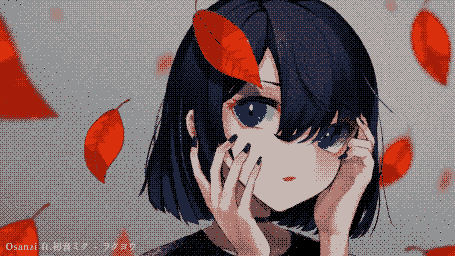- Email:
-


Articles


Osanzi - 「ラクヨウ (Rakuyou / Falling Leaves)」 Lyrics Translation
A nice EDM track, very memorable. Miku's mature voice here is a huge difference from most of her Vocaloid tracks.
Artist: Osanzi
Title: ラクヨウ[1] (Rakuyou / Falling Leaves)
Album: UNIXON (Purchase online here)
Singer: 初音ミク / Miku Hatsune
| Japanese | Romaji | English |
|---|---|---|
| 赤く染まる世界は | akaku somaru sekai wa | The world, shaded red, |
| 消えゆく言葉にさえ色付け | kieyuku kotoba ni sae irozuke | colors even disappearing words together with it |
| いつかこの想いにすら | itsuka kono omoi ni sura | and in time, even these feelings |
| 彩り痛みを付けたんだ | irodori itami o tsuketanda | were also shaded, hurt |
| 十六夜 愛した季節よ | izayoi ai shita kisetsu yo | Autumn[2], my beloved season, |
| 本に誉とするのか | hon ni homare to suru no ka | Can this really be considered an honor? |
| 言の葉よ まだ散らないで | koto no ha yo mada chiranai de | Words[3], don't fall and scatter yet, |
| 君に伝える その前は | kimi ni tsutaeru sono mae wa | until I am able to tell them to you |
| 薄く靡いた空色 | usuku nabiita sora iro | The color of the sky, swaying in a pale shade, |
| 忙しい世界を寝かしつけ | sewashii sekai o nekashitsuke | puts the busy world to sleep |
| やがてこの心にすら | yagate kono kokoro ni sura | And eventually, even this heart, |
| 儚い夢を見せていたの | hakanai yume o misete ita no | is shown fleeting dreams |
| 永久 思慕の想いよ | tokoshie shibo no omoi yo | My feelings of eternal longing, |
| 倦ねるふりはもうやめた | aguneru furi wa mou yameta | I have already stopped pretending that I don't know what to do |
| 言の葉よ まだ散らないで | koto no ha yo mada chiranai de | Words[3], don't fall and scatter yet, |
| 君に伝える その前は | kimi ni tsutaeru sono mae wa | until I am able to tell them to you |
Footnotes:
[1] The title is ラクヨウ, written in katakana, which is the reading of the word 落葉 (rakuyou / falling leaves), however, together with footnote [3], the falling of leaves refered to in this song is not the actual falling of leaves, but rather, words, so the songwriter must have wanted to avoid writing actual leaves (葉) in the title, therefore, resorting to katakana.
[2] Literally, the word written was 十六夜 (izayoi / the night after the full moon / the 16th night), but this is also used to refer to autumn / fall in poetry.
[3] In usual Japanese, "word(s)" is 言葉 (kotoba), but this is made from two words--言 (koto / speech / word) and 葉 (ha / leaf), which can be said as 言の葉 (koto no ha / word(s)). Since this song is about autumn, and that is when leaves fall, this is using 言の葉 (koto no ha / word(s)) as actual falling leaves, which the singer does not want to fall and scatter before she is prepared to say them herself.

Post Comment